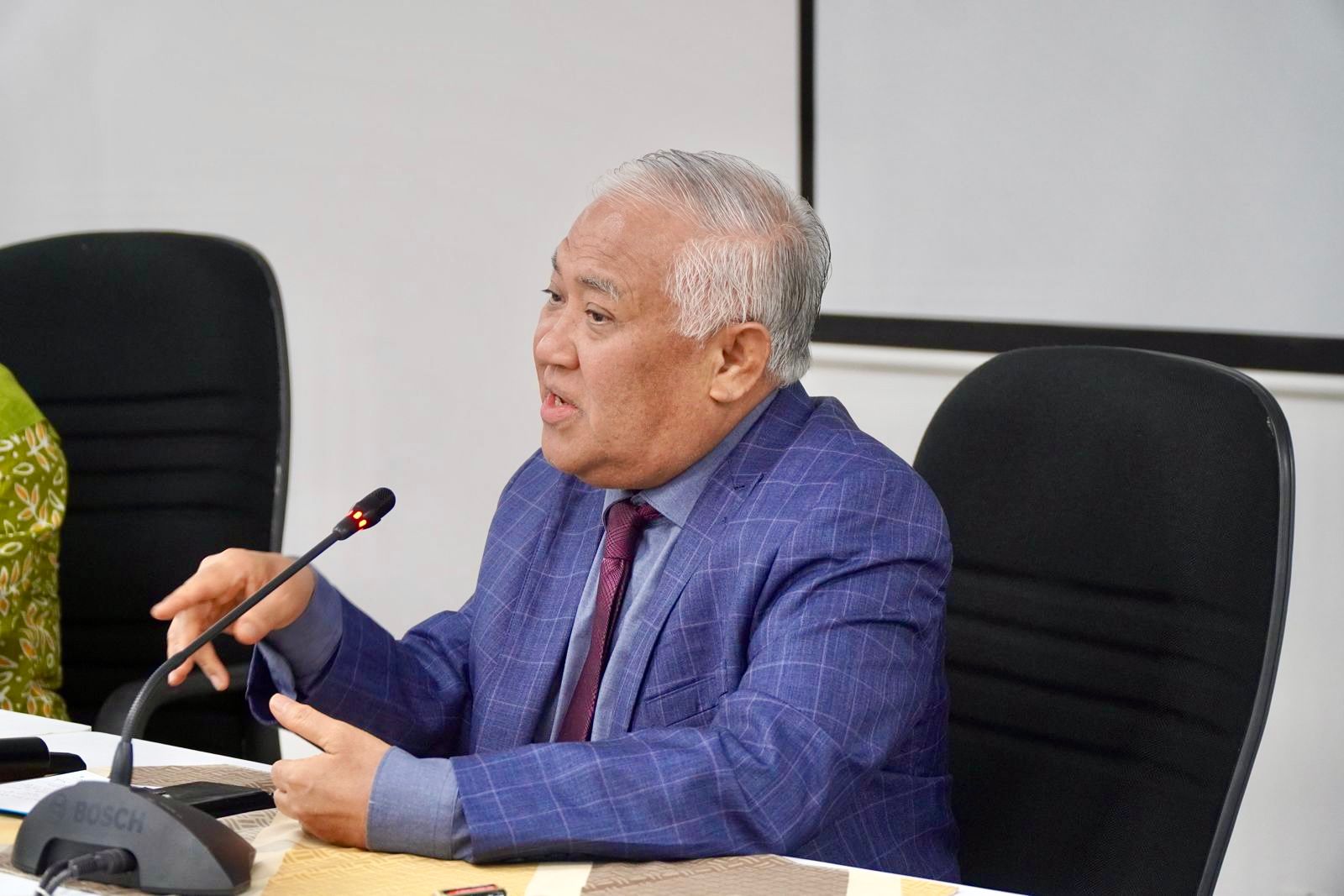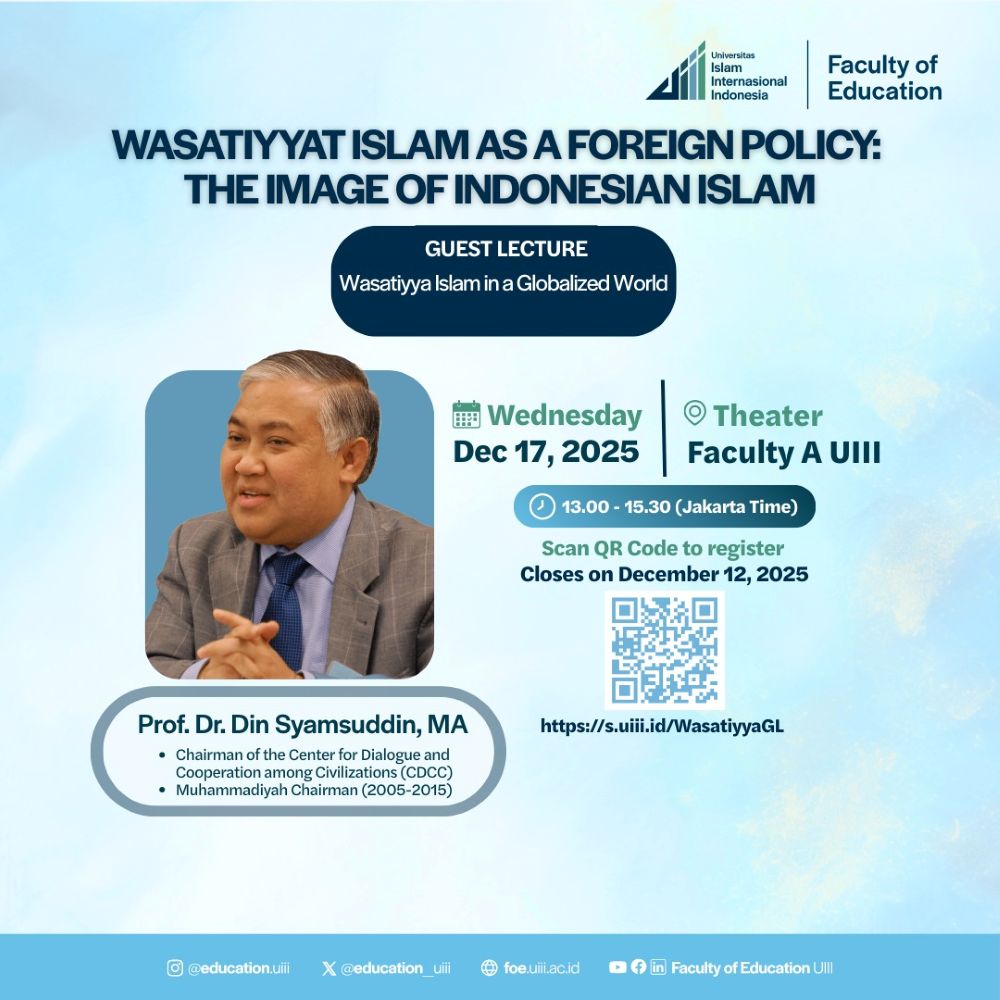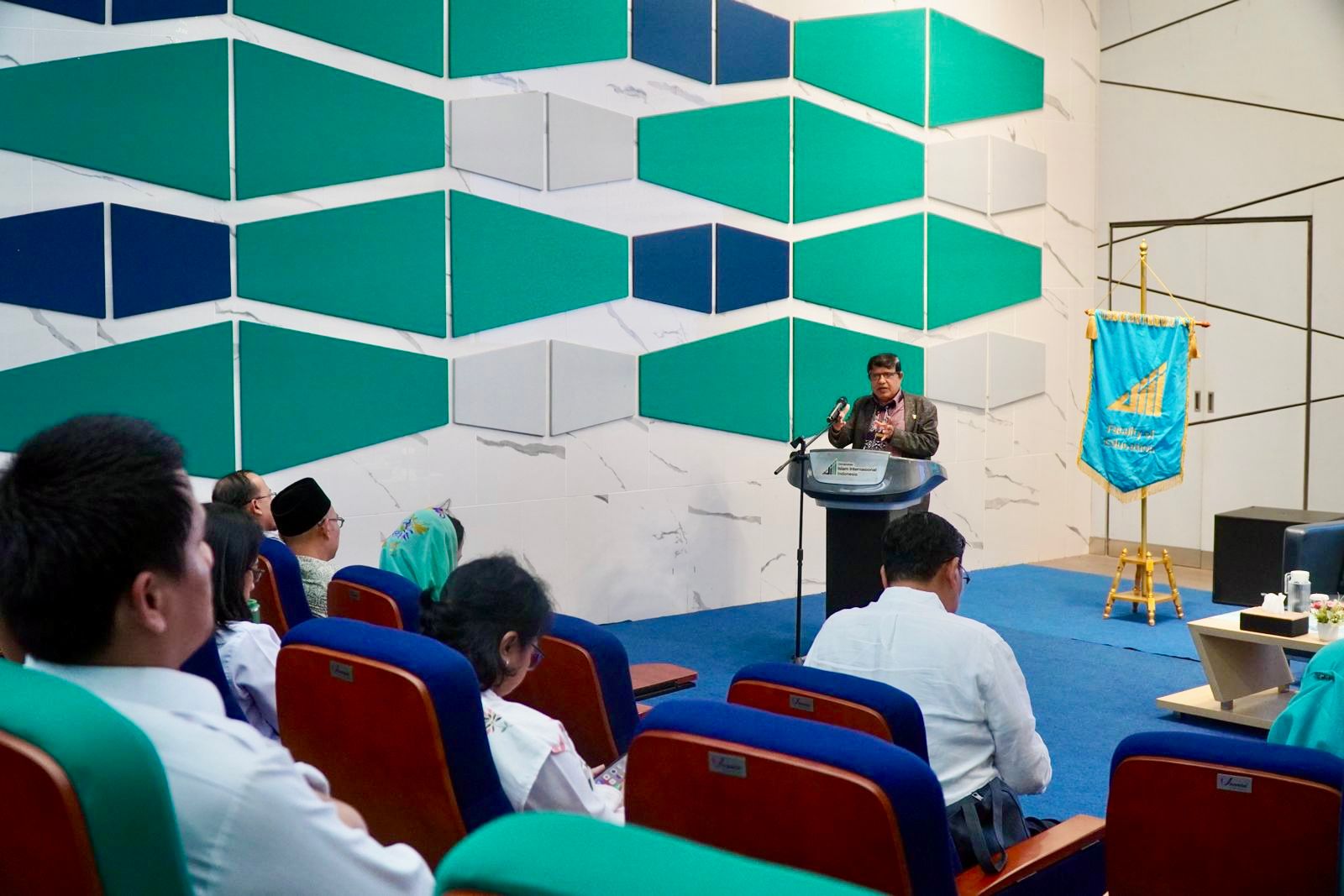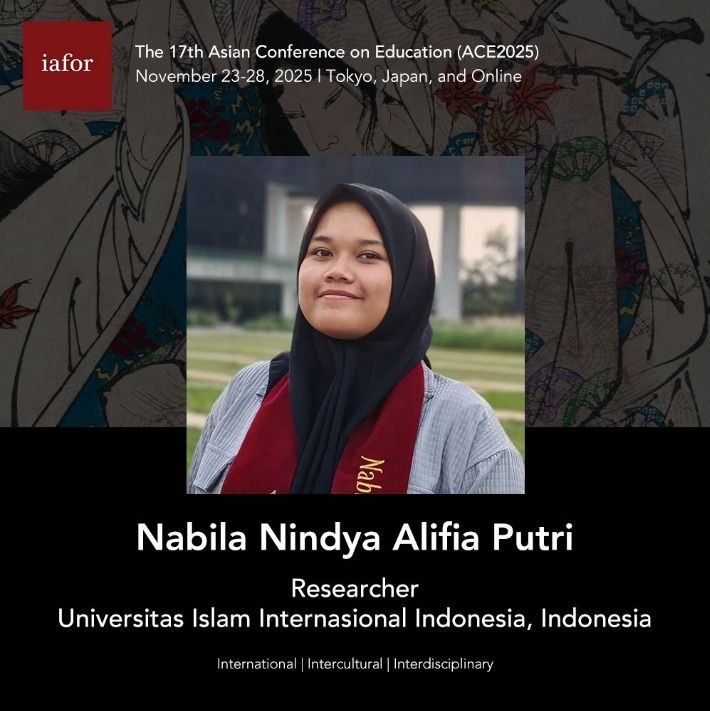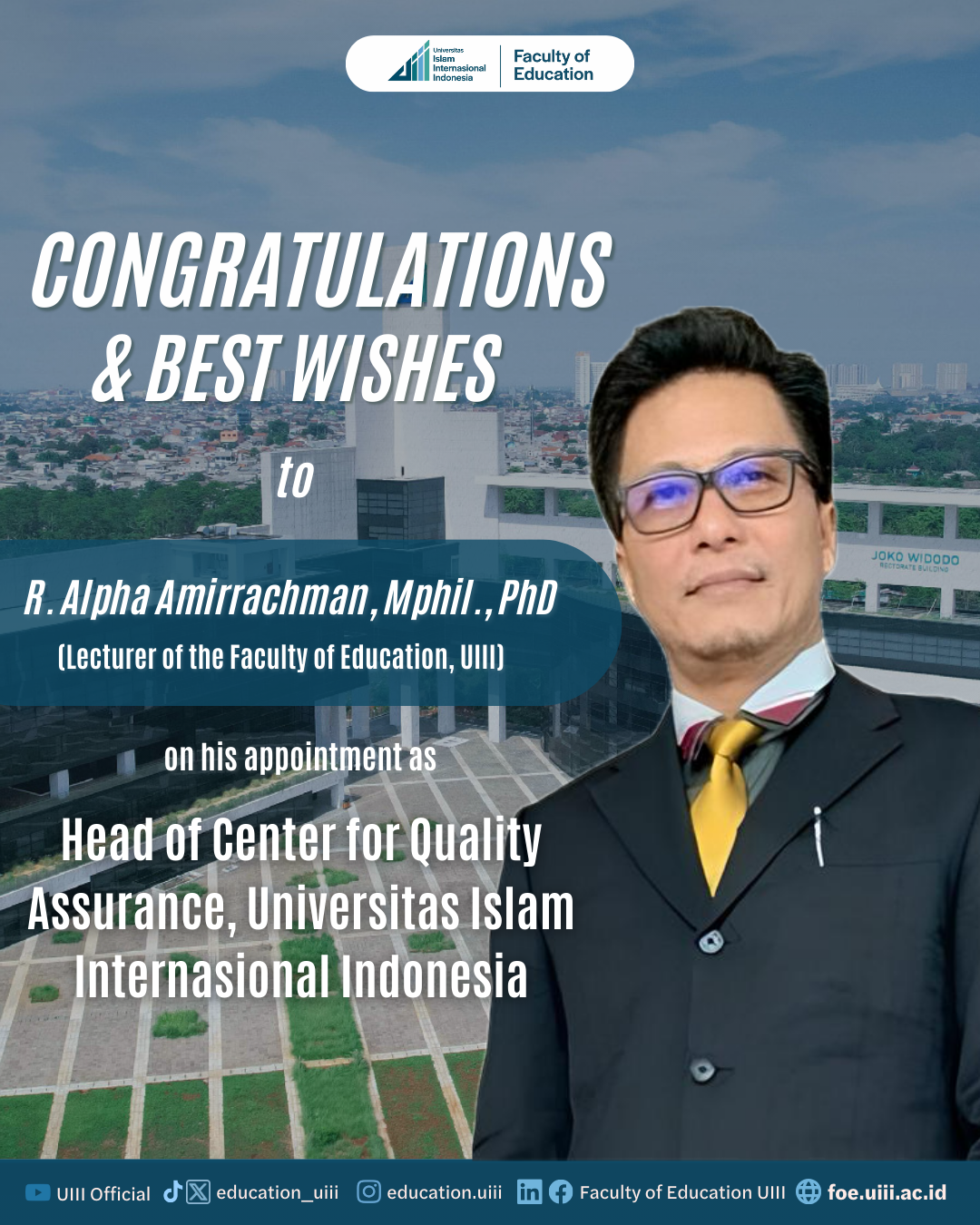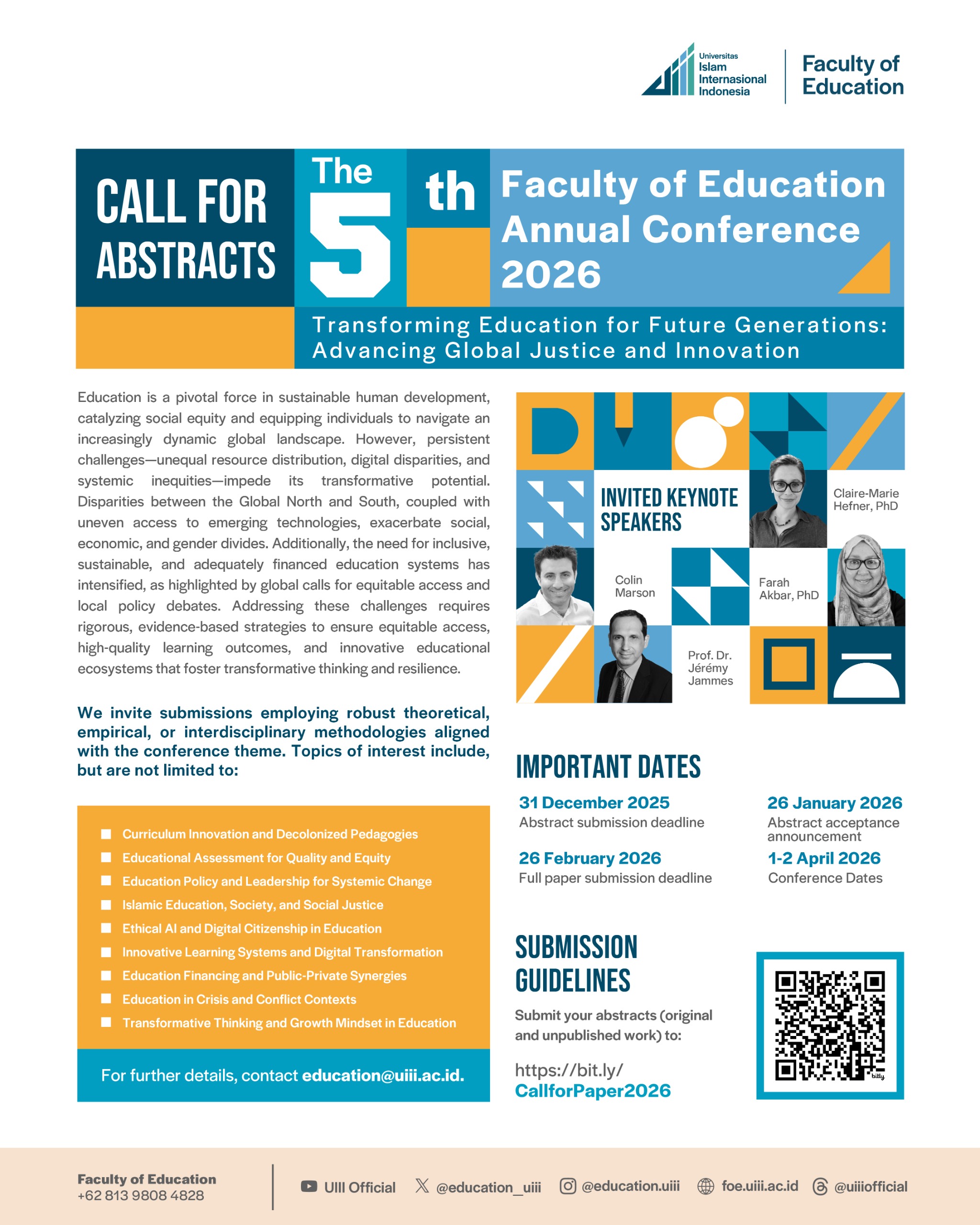Wasatiyyat Islam as Foreign Policy: Prof. Din Syamsuddin on Indonesia’s Global Islamic Identity

Wasatiyyat Islam as Foreign Policy: Prof. Din Syamsuddin on Indonesia’s Global Islamic Identity
December 18, 2025
By Supriyono | Photo: Achmad Ulyani
Universitas Islam Internasional Indonesia (UIII) continued its intellectual engagement on Islam and global affairs through a guest lecture titled “Wasatiyyat Islam as a Foreign Policy: The Image of Indonesian Islam”, held at the Faculty of Education on December 17, 2025. The lecture was part of the course Wasatiyyat Islam in a Globalized World and was convened by Andar Nubowo, PhD.
The session featured Prof. Din Syamsuddin, Chairman of the Center for Dialogue and Cooperation among Civilizations (CDCC) and Chairman of Muhammadiyah for the 2005–2025 period, who offered a reflective and historically grounded perspective on how Indonesia’s foreign policy embodies the Islamic principle of wasatiyyat—the middle path.
Prof. Din argued that Indonesia’s commitment to moderation is not merely rhetorical but constitutionally rooted. Referring to the Preamble of the 1945 Constitution, he emphasized that Indonesia’s mandate extends beyond safeguarding sovereignty and ensuring prosperity to actively participating in creating global peace and justice. “From the very beginning, Indonesia was envisioned as a nation that takes the middle way,” he noted, adding that this orientation is reflected not only in Pancasila but throughout the body of the Constitution.
 According to Prof. Din, Indonesia’s foreign policy represents what he described as a “constitutional deduction”—a direct manifestation of constitutional values—and a “sociological-political induction”, shaped by the aspirations and moral convictions of its people. In this framework, wasatiyyat Islam becomes both a moral compass and a diplomatic approach.
According to Prof. Din, Indonesia’s foreign policy represents what he described as a “constitutional deduction”—a direct manifestation of constitutional values—and a “sociological-political induction”, shaped by the aspirations and moral convictions of its people. In this framework, wasatiyyat Islam becomes both a moral compass and a diplomatic approach.
He illustrated this principle through Indonesia’s longstanding support for Palestinian independence, which he described as a constitutional obligation as well as a historical and ethical stance. Prof. Din reminded the audience that Palestinian leaders were among the earliest to recognize Indonesia’s independence, even before its formal proclamation in August 1945. Indonesia’s consistent advocacy for Palestine at international forums, including the United Nations, reflects what he called a principled foreign policy rooted in justice, peace, and humanitarian concern.
Beyond the Middle East, Prof. Din highlighted Indonesia’s role in peacebuilding efforts in Southern Philippines, where Indonesia served as a mediator between the Philippine government and the Moro Islamic Liberation Front (MILF). He described this involvement as a concrete example of Islamic moderation translated into conflict resolution and diplomacy.
The lecture also addressed how Indonesia has managed sensitive global religious issues through dialogue rather than confrontation. Prof. Din recalled moments when Indonesian Islamic leaders, civil society, and government institutions worked together to respond calmly to international controversies involving Islam, thereby preserving social harmony and projecting a mature global image of Indonesian Islam.
Reflecting on Indonesia’s engagement with Europe and interfaith dialogues during the mid-2000s, Prof. Din observed that Indonesia was increasingly viewed as a model of moderate Islam, offering an alternative narrative to extremism. He argued that this image was strengthened by Indonesia’s confidence in promoting wasatiyyat Islam as a civilizational contribution rather than a defensive identity.
Concluding his lecture, Prof. Din encouraged students to critically assess whether Indonesia’s foreign policy has successfully shaped the global perception of Indonesian Islam. He invited them to continue researching and analyzing Indonesia’s diplomatic practices, noting that scholars and students alike play a vital role in refining and advancing the discourse on Islam, moderation, and global coexistence.
The lecture underscored UIII’s commitment to fostering critical conversations on Islam’s role in international relations, positioning the university as a space where constitutional values, religious ethics, and global realities intersect.
Learning the Art of Wholeness: Rethinking Education with Prof. Ananta Kumar Giri
Learning the Art of Wholeness: Rethinking Education with Prof. Ananta Kumar Giri
December 8, 2025
By Supriyono | Photo: Achmad Ulyani
How might education look like if it aimed not merely to train the mind, but to awaken the whole human being? This question became the spirit of Lunch Talk #48 hosted by the UIII’s Faculty of Education, on December 8, 2025. In a thought-provoking session, Prof. Ananta Kumar Giri, COMPOSE Fellow at UIII’s Faculty of Social Sciences and Founding Honorary Executive Trustee of the Vishwaneedam Center for Asian Blossoming spoke on “Learning the Art of Wholeness: Integral Education and Beyond.”
Prof. Giri highlighted that the contemporary crisis of education is not merely about quality or curriculum but stems from the illusion of fragmentation. Modern systems, he argued, have disconnected learners from the wholeness of life by prioritizing mental memorization over the development of emotional, vital, spiritual, and social dimensions. He urged the audience to reimagine education not as a mechanical transfer of knowledge, but as a living process that integrates heart, body, mind, nature, and community.
Drawing on his book and rich fieldwork across the world, Prof. Giri shared examples of educational movements that cultivate wholeness. Integral Education, inspired by Indian thinker and spiritual teacher Sri Aurobindo, nurtures every dimension of the learner. Steiner-Waldorf schools teach by storytelling, creativity, and practical engagement. Free schools in Denmark embody community-based learning where children are taken seriously “not as people of tomorrow, but people of today.” These examples, he suggested, prove that education can be both deeply human and academically rich—without being reduced to exams and performance metrics.
Prof. Giri reflected on the dominance of written assessments and scholarly publications that reward technical output but neglect lived wisdom. “Education is not only in papers,” he emphasized, recalling how many meaningful learning moments emerge from conversations, creativity, service, and shared humanity rather than test scores or journal citations.
The talk also ventured into the philosophy of trans-disciplinarity, encouraging educators to dissolve boundaries between subjects such as science, arts, humanities, and ethics. He offered vivid examples of science lessons connected to poetry, water studies linked to spiritual meaning, and cooking classes that explore chemistry while nurturing equality among genders. The challenge, he noted, is to resist treating knowledge as compartmentalized fragments and instead allow learners to experience the world as interconnected.
A central moment in his reflection was his reminder that teachers are not authoritative transmitters but companions in learning. He shared stories of schools where children are engaged with nature, storytelling, and responsibility, and where teachers discover their own authenticity rather than claiming sovereignty over knowledge. He recalled a Waldorf educator’s words: “Children are souls in front of us”—not empty vessels but living beings who deserve respect, dialogue, and encouragement.
In his conclusion, Prof. Giri invited the faculty members and students to rethink educational practice. Instead of treating wholeness as a vague ideal, he challenged everyone to see it as a practical necessity that grounds meaningful learning, sustainable humanity, and ethical engagement.
Lunch Talk #48 reminded everyone that wholeness is not a luxury—it is a necessity. Education cannot stop at filling minds; it must help shape whole human beings. The talk concluded with a clear message: learning should connect heart, mind, body, and community. If educators choose this path, schools and universities can become places that not only prepare students for exams, but prepare them for life.
source: https://uiii.ac.id/learning-the-art-of-wholeness-rethinking-education-with-prof-ananta-kumar-giri/
Beyond Tools: Thinking about AI, Education, and our Humanity

Beyond Tools: Thinking about AI, Education, and our Humanity
By Nabila Nindya Alifia Putri
2025 is just around the corner to close its chapter, and on the fourth week of November was truly an unforgottable moment that I will always cherish in my life, at least after I graduated. On the 28th of November, 2025, I got a fruitful opportunity as a panelist at the ACE Online Conference. Academically and personally speaking, the session, “Human–AI Partnership in Teacher Education: Rethinking the Hybrid Teacher of the Future,” challenged me to articulate my research in a broader, global conversation about the future of teaching. The issues explored in the session resonated strongly with the findings of my master’s thesis, which I incorporated into the discussion.
During the panel session, I got asked a question. It was about the ways in which cultural, societal, and contextual aspects influence the way students respond to AI, which led me to reconsider my own research results in a new perspective. My research has demonstrated that there is great cultural focus on academic integrity within the Indonesian schools whereby teachers are expected to adhere to moral standards during the learning process. It also emphasizes the excessive dependence of teachers on community-based and informal learning instead of institutional training and the contextual fact that AI systems do not frequently support local curricula, language standards, and daily learning processes. It taught me that the problems I noticed during my fieldwork are not just technical or practical issues, as there were issues about academic integrity or a lack of infrastructure. Instead they are indicative of deeper questions of what we are as a society, the way we value relationships in the learning process, and how we negotiate change.
As I reflect further upon writing this reflection, these insights feel even more relevant in light of recent ecological disasters across Indonesia, particularly in Sumatra and parts of Java—events that are, in many ways, are consequences of human actions. The process of this happening brought back to me that education is never solely about mastering content or learning to use technology, but it is also about molding conscience, responsibility, and care. This lowkey gave me a silent hope that someday AI would not only be incorporated into the process of learning due to ease or effectiveness. I wish to believe that with the development of AI, we will be able to use AI to teach what really matters as well as our connection with the environment. Perhaps, we can have such simulations one day with the help of AI, or a virtual reality (VR) experience that lets students observe the life cycle of trees, the sensitivity of ecosystems, or the effects of environmental destruction. It is only a hope, which is a possibility in the future, but I was left convinced by this panel that it is a part of our job as educators to make ourselves believe that such possibilities exist.
Speaking in front of a global audience was not only challenging but also empowering. I needed to express myself, answer on the spot, and present the Indonesian context in a positive manner. At one point, the discussion was flowing smoothly that I encountered a sense of connectedness, not just to the panelists, but to the whole audience who cared about the future of education. It made me remember again on why I decided to pursue this field. In general, this experience taught me that insights from local contexts bear a great, yet universal importance. Personally, I also became developed. I learned that:
- I am able to address myself confidently, especially in global contexts,
- my research bears depth and relevance beyond local context.
What I take from this experience is a renewed sense of purpose. It further intensified my desire to investigate the problem of AI literacy, teacher identity, and educational ethics, yet also helped me to remember the larger mission of education itself. The panel session gave me a reality to be more grateful, solid, and hopeful person who has much to do in a world where technology and humanity develop in mutual communion, not only in order to be efficient, but in order to be caring, thoughtful and understanding of our world. And in most respects, this vision is also consistent with what I have studied during my masters study in the Faculty of Education at UIII: a place which has helped me to consistently think of education as a transformative power based on ethics, justice, responsibility to the society, and the environment.
Lastly, let’s take a moment to give our thoughts and prayers of our brothers and sisters affected by disasters in Sumatra, Java, and other places affected by disasters in Indonesia. May we always be given strength and fortitude to get through everything.
Improving Community Capacity Building in Education: Indonesian Experience

Mutohar, A. and Sumintono, B. (2026). "Improving Community Capacity Building in Education: Indonesian Experience" In Li, J. & Chan, P.W.K. Global Perspectives on Community Education and Learning SocietyDiversities, Challenges and Strategies. Routledge. https://www.routledge.com/Global-Perspectives-on-Community-Education-and-Learning-Society-Diversities-Challenges-and-Strategies/Li-CHAN/p/book/9781041233350
Lunch Talk #48: Learning the Art of Wholeness: Integral Education and Beyond

You are invited to join the Lunch Talk #48 at the Faculty of Education, UIII
Prof. Ananta Kumar Giri, PhD (COMPOSE Fellow at the Faculty of Social Sciences UIII and Founding Honorary Executive Trustee, Vishwaneedam Center for Asian Blossoming, Puducherry and Chennai) will share about: "Learning the Art of Wholeness: Integral Education and Beyond".
The concept of wholeness is often obscured by the illusion of fragmentary existence, which is frequently produced by socio-cultural and educational systems. The speech will share the book which proposes a new and creative path of wholeness, advocating for the realization of the interconnected parts of our lives as an emerging whole. In the field of education, this approach encourages the cultivation of wholeness by engaging multiple dimensions of life—such as the physical, mental, psychic, vital, and spiritual—instead of narrowly focusing on mental memorization. This vision is exemplified by initiatives like Integral Education, drawing inspiration from Sri Aurobindo and the Mother, which aims for the holistic unfolding of individuals and societies. The speech will further discusses other educational movements for wholeness, including the Steiner-Waldorf Schools and the free schools in Denmark, based on fieldwork conducted across various global locations.
Day/Date: Monday/December 8, 2025
Time: 13.00-14.30 (Jakarta Time)
Place: Theater, Faculty A Building
Online participation:
https://bit.ly/LunchTalkEdu48
E-Certificate is provided
Thank you!
Recorded on YouTube
https://www.youtube.com/watch?v=CGs0yIxoHvM
Mapping Discourse Visually: Why DNA Deserves a Place in Every Emerging Researcher’s Toolkit

Mapping Discourse Visually:
Why DNA Deserves a Place in Every Emerging Researcher’s Toolkit
By Nurul Izzah Febilia
A question commonly aksed by novice researchers is this: which tool is actually more worth using, DNA, Nvivo, or Quirkos? and why?
Last Monday, November 24, Estudia held a workshop on Discourse Network Analysis (DNA) for qualitative data analysis by Dr. Lukman Nul Hakim. Participating in the workshop to operate DNA and Visone is a complement to the experience that students really need. In the previous year, students also received a workshop on how to operate Quirkos and Nvivo on other occasions. Initially, I understood that this workshop was an introduction to qualitative data analysis applications. But as the session progressed, it became increasingly apparent that the DNA approach could open up new perspectives on how discourse is analyzed in depth and visualized in a more informative way. Thus, this activity is not only technical training, but also the entrance to a more creative and systematic approach to research.
Before the workshop started, the question I brought up when participating in this workshop was which one would be more worth it and will be used later: Quirkos, Nvivo, or DNA? Discussions about the advantages of each application often arise in the academic environment, considering that each one has its own characteristics and strengths. However, this DNA workshop offers a fresher perspective. In addition to providing an understanding of how a discourse can be mapped, analyzed, and visualized through a network approach, the workshop also affirmed a significant advantage: both DNA and Visone can be used for free. Dr. Lukman clearly said that if you want to use Nvivo or Quirkos optimally, then the investment is to subscribe to the paid version. This comparison is an important point for students who are looking for an effective and affordable tool.
The practice session using DNA software was then continued with Visone, and this part was one of the most interesting. Both software are relatively easy to operate, especially with Dr. Lukman's direction which is smooth and easy to follow. Participants not only learn how to read the network, but also how to construct it and interpret the relationships between nodes. This process is much more challenging and at the same time more satisfying than just reading theories. Even so, there was a slight technical problem for some participants in the form of a truncated software display so that the navigation buttons at the bottom were not visible. This appears on some laptops, possibly due to screen resolution or inappropriate display settings. The temporary solution used is to disable the laptop's taskbar so that the cursor can reach the button. This obstacle is an important note so that participants can anticipate similar situations in the future, especially when working with visual software.
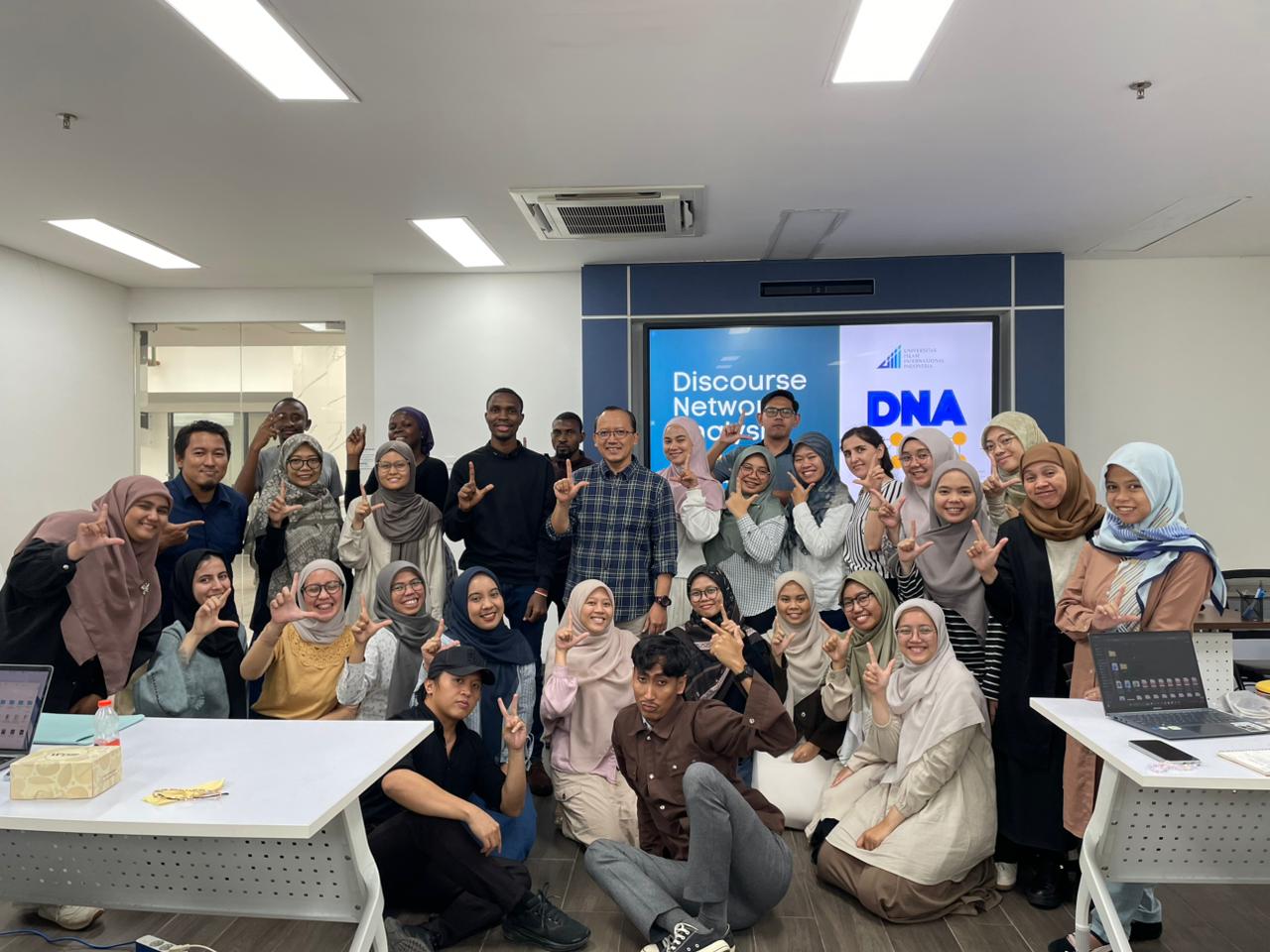 At the end of the activity, I asked several participants about their impressions after taking part in the workshop. Almost all of them state that this software is relatively easy to operate, especially for new users compared to other qualitative analysis applications. Of course, it has the advantage of not requiring license fees. The biggest challenge remains the coding process, which takes time and practice to get done quickly and accurately. Interestingly, a number of participants who had previously used other software such as Nvivo stated that after participating in this workshop they tended to use DNA for their next research. This collective reflection shows that the workshop is a very valuable scientific complement, as if it is a complement that wraps the learning in the Educational Research Methodology and Statistical Analysis courses with network-based qualitative analysis practices.
At the end of the activity, I asked several participants about their impressions after taking part in the workshop. Almost all of them state that this software is relatively easy to operate, especially for new users compared to other qualitative analysis applications. Of course, it has the advantage of not requiring license fees. The biggest challenge remains the coding process, which takes time and practice to get done quickly and accurately. Interestingly, a number of participants who had previously used other software such as Nvivo stated that after participating in this workshop they tended to use DNA for their next research. This collective reflection shows that the workshop is a very valuable scientific complement, as if it is a complement that wraps the learning in the Educational Research Methodology and Statistical Analysis courses with network-based qualitative analysis practices.
In the end, I realized that the opportunity to participate in this workshop for free was a great privilege. This opportunity complements the learning experience because both the campus and the faculty are very supportive of students by continuing to provide learning spaces, support, and facilities that make me feel valued as part of an academic community that is serious about building the capacity of its students. I feel very fortunate to have been part of an environment that encourages students to develop without limits. In this case, gratitude must also be given to Estudia, the faculty, and the entire team who have facilitated activities that are very supportive of students.
Furthermore, as a student at the faculty of education, I see additional benefits of this workshop from a different perspective. It not only provides a technical insights into qualitative analysis, but also demonstrates how complex material can be taught effectively. The way Dr. Lukman teaches is indeed impressive. However, his ability to teach an application in a light, clear, and systematic way became a note-taking for me in increasing the capacity of learning methods as a teacher. I can affirm that one of the reasons why this tool feels so convincing is the way the instructor presents the material. The structured approach, complete with technical guidance such as "if you want results like this, click on these sections", makes the learning process feel logical and easy to follow. A strong pedagogical approach made me not only learn tools, but also learn the learning methods themselves.
Overall, this DNA and Visone workshop provided new understanding, new skills, and greater confidence to face qualitative research, especially in the context of writing a thesis later. This experience is felt not only as technical training, but as an intellectual investment that enriches academic perspectives and research practices within the Faculty of Education, and I look forward to similar activities in the final year of my studies.
Call for Abstracts: The 5th Faculty of Education Annual Conference 2026 Transforming Education for Future Generations: Advancing Global Justice and Innovation

Call for Abstracts: The 5th Faculty of Education Annual Conference 2026
Transforming Education for Future Generations: Advancing Global Justice and Innovation
Education is a pivotal force in sustainable human development, catalyzing social equity and equipping individuals to navigate an increasingly dynamic global landscape. However, persistent challenges—unequal resource distribution, digital disparities, and systemic inequities—impede its transformative potential. Disparities between the Global North and South, coupled with uneven access to emerging technologies, exacerbate social, economic, and gender divides. Additionally, the need for inclusive, sustainable, and adequately financed education systems has intensified, as highlighted by global calls for equitable access and local policy debates. Addressing these challenges requires rigorous, evidence-based strategies to ensure equitable access, high-quality learning outcomes, and innovative educational ecosystems that foster transformative thinking and resilience.
The Faculty of Education at Universitas Islam Internasional Indonesia (UIII) invites scholars, policymakers, educators, and researchers to submit abstracts and papers for the 5th Annual Conference, to be held in 2026, under the theme "Transforming Education for Future Generations: Advancing Global Justice and Innovation." This two-day hybrid conference will serve as a global platform for interdisciplinary dialogue, empirical research, and policy-relevant solutions, drawing on UIII’s Faculty of Education concentrations: Curriculum, Teaching, and Learning; Educational Assessment and Evaluation; Education Policy, Management, and Leadership; and Education and Society. The conference aims to address pressing challenges in global education, from ethical AI integration to fostering growth mindsets and equitable financing.
We invite submissions employing robust theoretical, empirical, or interdisciplinary methodologies aligned with the conference theme. Topics of interest include, but are not limited to:
* Curriculum Innovation and Decolonized Pedagogies: Designing inclusive curricula and teaching practices that integrate diverse cultural, historical, and Islamic perspectives to foster equitable, innovative and deep learning environments,
* Educational Assessment for Quality and Equity: Advancing evidence-based assessment and evaluation methodologies to ensure high-quality, inclusive learning outcomes, particularly for diverse and marginalized groups.
* Education Policy and Leadership for Systemic Change: Formulating policies and leadership strategies to promote global partnerships, sustainable financing, and resilient education systems, linked to the Education Policy, Management, and Leadership concentration.
* Islamic Education, Society, and Social Justice: Investigating education’s role in promoting social cohesion, civic engagement, and equitable access for girls, boys, and disadvantaged groups, especially in conflict-affected regions.
* Ethical AI and Digital Citizenship in Education: Leveraging artificial intelligence and digital technologies to enhance learning while addressing ethical challenges, algorithmic biases, and access disparities.
* Innovative Learning Systems and Digital Transformation: Developing hybrid, lifelong, and technology-enabled learning ecosystems to shift paradigms from traditional schooling to flexible, inclusive learning.
* Education Financing and Public-Private Synergies: Creating sustainable funding models through public-private partnerships to support free education mandates and strengthen school ecosystems, particularly in underserved areas.
* Education in Crisis and Conflict Contexts: Ensuring children’s right to education in times of conflict and displacement through resilient school ecosystems and global partnerships.
* Transformative Thinking and Growth Mindset in Education: Fostering resilience, adaptability, and innovative thinking in learners and educators through evidence-based pedagogical and policy interventions to promote lifelong learning and equitable educational outcomes.
Submission Guidelines
Submissions should be original and unpublished
Please submit contributions to: https://bit.ly/CallforPaper2026
Important Dates:
- Abstract submission deadline: 31 December 2025
- Abstract acceptance announcement: 26 January 2026
- Full paper submission deadline: 26 Februari 2026
- Conference dates: 1-2 April 2026
Best Paper Awards:
Selected paper(s) will be awarded up to IDR 7,500,000.
This conference is free of charge . However, participants are expected to cover their own travel and accommodation expenses.

